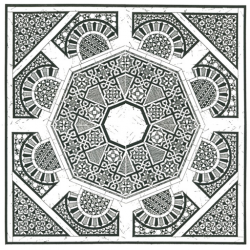“Alas for the servants! there comes not to them an apostle (with truth) but they mock at him.” (Qur’an 36:30)
According to the Christian gospels, when Jesus was arrested and held in Jerusalem, the Roman soldiers charged with his capture were simultaneously amused by and spiteful towards him. Their spite was tinged with a sense of the superiority they felt through the virtue of belonging to what they believed was a vastly superior culture, one grounded in “reality”, not one based on some vague prophecies and the impractical teachings of a so-called Prophet. Their solid conviction in the pre-eminence of their civilization, their certainty in the unshakable power and authority backing them created within them a disdain and contempt for the unkempt, ragged looking disciples and for the bearded brown Prophet who led them. Malice, and anger combined with arrogance, caused them to first mock and deride Jesus and then, according to the gospels, to brutalize him.
“….And the men that held Jesus mocked him, and smote him. And when they had blindfolded him, they struck him on the face, and asked him, saying, Prophesy, who is it that smote thee? And many other things blasphemously spake they against him.” (Luke 63 – 65)
Assured by his position in office and by the support of the people, Pilate ordered Jesus to be scourged and then handed him over to the mockery of his men in the praetorium. They engaged in jest and sport against Jesus by dressing him in a viciously farcical mockery of kingly attire, pressing a ring of thorns onto his head.
“…Then the soldiers of the governor took Jesus into the common hall, and gathered unto him the whole band of soldiers. And they stripped him, and put on him a scarlet robe. And when they had platted a crown of thorns, they put it upon his head, and a reed in his right hand: and they bowed the knee before him, and mocked him….” (Matthew 27 – 29)
Here there is the mockery by the temporarily powerful as a display of their power and as a reassurance to themselves of their superiority. This is a drama that has been replayed endlessly throughout history in different ways (by the irreligious, the anti-religious, and those (religious or not) who overthrow principle and let power politics shape their outlook and behavior. We have seen it repeatedly in our time, we see it today in the land of Jesus (and other great prophets) where occupiers run amok, backed by the militarily powerful. We see it in the dehumanizing, mocking rhetoric of their propaganda and in years of callous and deadly oppression by them.
In the case of Jesus, it was insufficient to have sway over him and to determine his fate, so it was also necessary to attempt to debase him and that which he stood for – to cancel out the psychological discomfort that his existence generated. It is a way of lashing out at the possibilities that the teachings and his very presence raises. If that reality is derided, then we can be satisfied with mere physical and psychological existence, and power and authority, however immoral, becomes the forefront of our experience and is satisfying and sufficient for us.
Yet there remains an agitation (manifested in attitude and action) in those who take such a mental path. “Man was created in restlessness/anxiety.” (Qur’an 70:19). In the case of those who confront, disparage, and mock the Prophets, this state of restlessness, of dissatisfaction and anxiety increases in urgency and intensity when they face one who advances claims concerning the existence of realities that transcend the worlds we know. And so the reaction is disproportionate and extreme as perhaps it is a reaction to an internal contradiction – an attempt to counter inner anxiety and tension by exercising a mocking superiority. Perhaps this arises from an unrecognized, unacknowledged, unrealized metaphysical connection – a subtle but foundational recognition of the Absolute – the remaining echo of our nafs acknowledgment of it’s meeting with God in pre-eternity.
“When thy Lord drew forth from the Children of Adam all their descendants, and asked them to bear witness concerning themselves (concerning their own souls, their nafs): “Am I not your Lord (who cherishes and sustains you)?”- They responded: “Yes! To this we bear witness!” (This), lest you say on the Day of Return: “Of this we were ignorant” (Qur’an 7:172)
We may not be able to grasp the full meaning and import of this covenant and the manner in which it dwells within us, but it nevertheless exists as an impulse within our being. And so long as it exists unrecognized, unknown, buried, forgotten and unsought, denied appropriate outlets, human restlessness and anxiety turns and churns unquenched. And in times of stress or challenge to the status quo, governments turn unflinchingly, zealously murderous, and their citizens, like Jesus’ mockers and scourgers, become unfeelingly callous.
“They only desire to ruin and erase you: Rank hatred has already appeared from their mouths: What their hearts conceal is far worse. We have made plain to you the Signs, if ye have wisdom.” (Qur’an 3:118)

